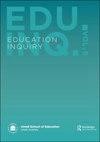“We help Germany create greater equality.” Logics and rationales in exporting ‘Scandinavian’ early childhood education and care
IF 1.6
Q2 EDUCATION & EDUCATIONAL RESEARCH
引用次数: 0
Abstract
This study targets hitherto largely understudied empirical processes and activities through which certain ideas and imaginaries are being commercialised and used by corporate actors in the global Early Childhood Education and Care (ECEC) industry. The aim is to analyse and critically discuss representations of the Scandinavian ECEC regime in the context of ECEC export. This is achieved empirically through a case study of a Swedish education company and its expansion in Germany, as well as by devoting analytical attention to the social, political and fantasmatic logics in the processes that constitute and characterise the “Scandinavian ECEC offer” as it is being exported. The analysis draws on corporate documents, websites and interviews with top-level company representatives. The analysis highlights how the Scandinavian ECEC regime is made up of four interlinked elements; equality, the autonomous child, integration of care and learning and outdoor pedagogy, aligned and sustained by “gripping” and “sticking” forces in fantasmatic logics that hide contingencies. In summary, the powerful imaginary of the Scandinavian ECEC regime, bringing accessibility, social justice, gender equality, nature, democracy, children’s rights and autonomy, serves to conceal the political and ideological dimension of the economic logic of capitalism.“我们帮助德国创造更大的平等。”输出“斯堪的纳维亚”早期儿童教育和护理的逻辑和原理
本研究的目标是迄今为止尚未充分研究的经验过程和活动,通过这些过程和活动,某些想法和想象正在被商业化,并被全球幼儿教育和护理(ECEC)行业的企业行动者使用。目的是分析和批判性地讨论在ECEC出口背景下斯堪的纳维亚ECEC制度的表现。这是通过对一家瑞典教育公司及其在德国扩张的案例研究,以及对“斯堪的纳维亚ECEC提议”出口过程中构成和特征的社会、政治和幻想逻辑的分析来实现的。该分析利用了公司文件、网站以及对公司高层代表的采访。分析强调了斯堪的纳维亚经济共同体制度是如何由四个相互联系的要素组成的;平等、自主的孩子、关怀和学习的整合以及户外教育,这些都是由隐藏着偶然性的虚幻逻辑中的“抓住”和“粘住”力量来协调和维持的。总而言之,斯堪的纳维亚ECEC政权的强大想象,带来了可达性、社会正义、性别平等、自然、民主、儿童权利和自治,掩盖了资本主义经济逻辑的政治和意识形态层面。
本文章由计算机程序翻译,如有差异,请以英文原文为准。
求助全文
约1分钟内获得全文
求助全文
来源期刊

Education Inquiry
Social Sciences-Sociology and Political Science
CiteScore
5.00
自引率
0.00%
发文量
34
 求助内容:
求助内容: 应助结果提醒方式:
应助结果提醒方式:


